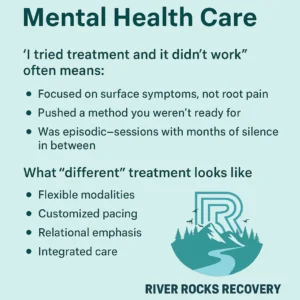You’ve been to sessions. You’ve taken medications. You’ve tried “the program.” You gave effort. You hoped. But the change either never came—or if it did, it slipped through your fingers.
I’m not surprised you feel skeptical. You’ve learned to protect yourself from disappointment. But before you close the door again, please let me try explaining a different way forward. River Rocks Recovery offers mental health treatment that tries to reach what past attempts couldn’t.
“It Didn’t Help” Often Means It Didn’t Help You
When people say, “I tried treatment and it didn’t work,” what they usually mean is: It didn’t help me deeply enough. That’s not failure. That’s a signal.
Maybe your prior treatment:
- Focused on surface symptoms, not root pain
- Pushed a method you weren’t ready for
- Was episodic—sessions with months of silence in between
- Treated you as a case, not a human
All of those can cancel therapy’s impact. What feels like failure is often a mismatch.
The First Job of Healing Is Safety—not Fixing
One of the biggest gaps in “treatment that didn’t work” stories is the absence of safety.
You might have felt forced, rushed, misunderstood, judged, or gaslit. You were asked to open dark doors before the locks felt safe. You may have sat across from someone who wanted to “get you better” faster than you could trust them.
At River Rocks, mental health treatment begins with safety—emotional, physical, relational. Only when your system can rest in that safety can real change happen.
Treatment Isn’t a Toolbox You Use Once—it’s a Craft You Learn Over Time
People often expect therapy or meds to be instant repair. That expectation is part of the reason so many stop early. They wait for the “fix,” don’t see it, and assume nothing will help.
What you need instead is a craft. A method, revised over time, shaped around your life. One therapist, multiple modalities, experiment, feedback, adaptation.
You might need:
- Trauma-focused therapy (EMDR, somatic work)
- CBT or DBT for patterns you can actively work with
- Medication support to balance your brain chemistry
- Group work to remind you that healing is shared
Each time you try, you get information—not failure.

Your Resistance Wasn’t a Barrier—it Was a Sign
Think of your resistance as a guardian, not an enemy.
When treatment “didn’t work,” maybe your inner part protested before it even started. This might hurt. This might open wounds I can’t close. I won’t survive the change.
That resistance deserves respect and understanding. Not to be bullied or overridden—but understood and invited in. In the right setting, your resistance becomes collaborator, not saboteur.
What “Different” Treatment Looks Like at River Rocks
Here’s where possibility shifts. At River Rocks Recovery in Middletown, Ohio, we don’t assume you were wrong. We assume you were underserved.
In our mental health treatment program, you’ll find:
- Flexible modalities: We use EMDR, trauma work, CBT, supportive talk—not rigid one-size approaches.
- Customized pacing: No push to “go deep” before you’re ready.
- Relational emphasis: You’re not a diagnosis. You’re a person with story, trust issues, shame, strengths.
- Continuity: Because many failed treatments die between appointments. We stay in touch, watch for patterns.
- Integrated care: We pair therapy with other supports (psychiatry, skills work) so you don’t feel like parts pulling in different directions.
You don’t have to sit through “the same thing” again. You get a journey that learns from what you’ve already tried.
You Can Return with Caution—and Be Seen Differently
It’s understandable if your first impulse is to say, I’ll just avoid all this. But you don’t have to go back with blind trust. Go back with boundaries:
- Ask upfront: “How will you adapt if this isn’t working for me?”
- Demand clarity: “What happens if I feel worse before better?”
- Maintain autonomy: You get choices. You approve next steps. You say stop if it’s not right.
- Watch for relational cues: Do you feel heard, safe, respected?
Returning doesn’t mean you were wrong before. It means your healing is still alive.
Healing Isn’t Linear—Your “Failed” Treatments Are Part of the Map
When you add up all your prior attempts, they aren’t wasted. They’re clues:
- What you needed but didn’t get
- What kind of therapist didn’t fit
- What dynamic triggers your resistance
- What showed promise (even briefly)
Your history is not a weight. It’s context. And now we use it to build something different.
You’re not starting over—you’re using more information now.
FAQs About Mental Health Treatment When You’ve “Been There”
What if therapy always feels the same and stale?
Ask your therapist: How will this be different with me? The right therapist should revise approaches, integrate new methods, challenge therapy-as-habit. If you sense boredom or repetition—speak up.
Do medications even work if they didn’t before?
Yes—context matters. Medications work best when the rest of your system (sleep, stress, relationships) is stabilized. The same meds may act differently when your environment, trust, and therapy support change.
What if I’m afraid of re-traumatizing myself?
That fear is real. A good therapist won’t push you into that. They’ll move slowly. Offer control. Give you exit signals. Work in parts. Invite—not demand.
How long will this process take?
There’s no fixed timeline. Some people shift in months. Others in years. What matters is not speed—it’s fidelity. That you stay long enough for the shifts to root.
What if I relapse in mood, behavior, or old patterns?
That’s not failure. That’s data. When you relapse, we don’t abandon you. We ask: What led you here? What missing support? What boundary failed? Then we rebuild from that spot.
You’ve tried before. You lost time, hopes, energy. You stuffed disappointment deep, built walls around your heart.
But what if treatment can finally help? What if those past “didn’ts” are part of why the next try can?
Healing doesn’t mean being flawless. It means being seen—and kept through the cracks.
Call (888) 905‑6281 to learn more about our mental health treatment services in Middletown, Ohio. You deserve a version of treatment that finally honors you.

